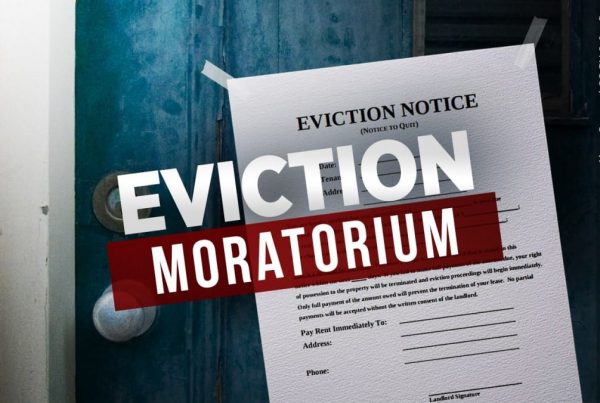No Non-Payment Evictions Allowed During Corona Virus State of Emergency
The newest mandate by Multnomah County has made it so landlords can NOT evict a tenant for not paying rent if their income has been negatively effected by the Coronavirus pandemic mandates. The tenant must be able to show they aren’t able to pay rent because of a reason related to the pandemic and they will have 6 months to pay the unpaid rent after the state of emergency is lifted. Below is the complete text of this ordinance. If you are a landlord with a tenant that you think will take advantage of this option then read through these details and be careful you don’t unintentionally violate it in the near future. With how quickly things are changing right now also keep an eye on your email for future updates that effect landlords.
Complete Ordinance Text:
BEFORE THE BOARD OF COUNTY COMMISSIONERS FOR MULTNOMAH COUNTY, OREGON
ORDINANCE NO. ______
Ordinance to address COVID-19 Eviction Moratorium and Declaring an Emergency.
The Multnomah County Board of Commissioners Finds:
A. On March 11, 2020, the Multnomah County Chair signed Executive Rule No. 388 declaring an emergency for the entire County to address the continued spread of the COVID-19 illness, loss of life, an extreme public health risk, and significant economic impact in the region. On March 17, 2020, an Addendum to Executive Rule No. 388 was issued providing additional measures to address the emergency conditions. This Ordinance ratifies Executive Order 388 and its Addendum.
B. The spread of COVID-19 has caused widespread closures and cancellations in the region and across the country, and public health officials recommend isolation and social distancing.
C. As the response to this public health emergency escalates, the County anticipates that many residents will experience direct economic impacts. The Federal government and State of Oregon have declared emergencies. To date, Oregon Governor Kate Brown announced the closure of all Oregon K-12 schools through the end of April, along with widespread restrictions for businesses throughout the hospitality, entertainment, and retail industries. These restrictions will result in lost wages for employees.
D. The County is taking measures to avoid the creation of an additional economic and public health emergency that would result from subjecting more households to homelessness as a result of the economic impacts of COVID-19. Additionally, to encourage County residents to comply with closures and prevent further spread of COVID-19, the County must protect residents from the fear of potential eviction due to economic dislocation. The ability to maintain housing during this pandemic is a public health imperative.
Multnomah County Ordains as Follows:
Section 1. Title
This Ordinance shall be known as the Multnomah County “COVID-19 Eviction Moratorium.”
Section 2. Purpose
The purpose of the COVID-19 Eviction Moratorium is to promote housing stability during the COVID-19 pandemic and to avoid a preventable increase in homelessness due to the economic effects of COVID-19.
Section 3. Definitions
For the purposes of this Ordinance, the following definitions shall apply, unless the context requires a different meaning:
A. “Affected Tenant” means a Tenant or a Tenant’s Family member, who has, as a result of the OVID-19 pandemic, suffered a substantial loss in income due to:
(1) job loss;
(2) reduction in hours worked;
(3) business closure;
(4) school or daycare closure causing missed work to care for a minor child;
(5) missed work to care for illness of self or a family member; or
(6) other similar causes of lost income due to the COVID-19 pandemic.
B. “Dwelling Unit” is defined by ORS 90.100(12).
C. “Evict” means to terminate a rental agreement or file an action to take possession of the Dwelling Unit as provided in ORS 105.105 to 105.168.
D. “Family member” is defined by ORS 657B.010.
E. “Household” means one or more Tenant(s) who occupy any individual Dwelling Unit, including each dependent of any Tenant whose primary residence is the Dwelling Unit.
F. “Landlord” is defined by ORS 90.100(23).
G. “Rent” is defined by ORS 90.100(37).
H. “Rental Agreement” is defined by ORS 90.100(38).
I. “Tenant” is defined by ORS 90.100(47).
J. “Termination Notice” means a written notice indicating the Landlord’s intention to terminate the rental agreement and take possession of the Dwelling Unit, delivered by a Landlord to a Tenant in accordance with ORS 90.392 or ORS 90.394, and any other applicable state, federal, or local laws.
K. “Utilities or service charges” includes any charges for services listed in ORS 90.315(1)(d).
Section 4. Scope
This Ordinance applies to an Affected Tenant and Affected Tenant’s Household in any Dwelling Unit in Multnomah County, unless the Dwelling Unit is located within an incorporated city that has adopted a more restrictive ordinance. This Ordinance does not apply to other arrangements or occupancies described in ORS 90.110 or 90.113 that are not subject to ORS Chapter 90.
Section 5. Temporary Moratorium on Nonpayment Terminations
A. Temporary Moratorium
1. Upon receipt of notice and documentation as described in Section 5.B.2 below, a Landlord may not Evict an Affected Tenant or member of the Affected Tenant’s Household for nonpayment of Rent, or for the nonpayment of fees and utilities or service charges that the Tenant pays directly to the Landlord.
2. Nothing in this Ordinance shall relieve tenants of liability for unpaid rent, fees, or utilities or service charges. During the period of moratorium on evictions imposed by the Ordinance, Rent, fees, and utilities or service charges owed to the Landlord will continue to accrue at the rate agreed to in the Rental Agreement.
3. Following the expiration of the moratorium period, Affected Tenants shall have six months to pay all accrued, unpaid Rent, fees, and utilities or services charges owed to the Landlord. No late fee may be charged or collected for delayed payments under this provision due to an Affected Tenant’s loss of
income; nor may a landlord seek to recover Rent, fees, or utilities or service charges that are delayed for the reasons stated in this moratorium through the eviction process.
income; nor may a landlord seek to recover Rent, fees, or utilities or service charges that are delayed for the reasons stated in this moratorium through the eviction process.
4. This moratorium applies only to Affected Tenants and Affected Tenants’ Households impacted by the COVID-19 pandemic as provided herein, and this moratorium does not apply to evictions for any other lawful purpose.
B. Affirmative Defense to Eviction
1. Each landlord that seeks to evict an Affected Tenant for nonpayment of Rent, fees, or utilities or service charges must comply with this Ordinance. Noncompliance with any applicable component of this Ordinance shall constitute an affirmative defense for an Affected Tenant or member of an Affected Tenant’s Household against any action to Evict.
2. To assert this defense, an Affected Tenant shall:
a. Notify the Landlord on or before the day that a payment for Rent, fees, or utilities or service charges is due that the Affected Tenant is unable to make payment due to a substantial loss of income as a result of the COVID-19 pandemic; and
b. Provide written documentation, or other objectively verifiable information, establishing that the Affected Tenant has suffered a substantial loss in income due to:
i. job loss;
ii. reduction in hours worked;
iii. business closure;
iv. school or daycare closure causing missed work to care for a minor child; or
v. missed work to care for illness of self or a family member; or (6) other similar causes of lost income due to the COVID-19 pandemic.
3. The following documents shall create a rebuttable presumption that the Affected Tenant has met the documentation requirement set forth above:
a. Letter from employer citing COVID-19 as a reason for reduced work hours or termination;
b. Letters from clients or customers citing COVID-19 as a reason for reducing or cancelling purchase orders, requests for services-for-hire, or other profit generating contracts;
c. Letter from a school or other government issued documentation declaring a school closure related to COVID-19; or
d. Letter from a medical doctor recommending rest at home, self-quarantine, hospitalization, or similar measures for the Affected Tenant or a family member.
Section 6. Penalties and Remedies
A. Any Landlord that fails to comply with this Ordinance may be subject to civil proceedings for displacement of Affected Tenant(s) and members of Affected Tenant(s) Household, initiated by the County, an Affected Tenant, or an evicted member of the Affected Tenant’s Household for damages.
B. A Landlord that fails to comply with any of the requirements set forth in this Ordinance shall be subject to appropriate injunctive relief, and shall be liable to the Tenant for an amount up to 3 times the monthly Rent as well as actual damages, reasonable attorney fees, and costs.
C. Nothing herein shall be deemed to interfere with the right of a Landlord to file an action against a Tenant or non-Tenant third party for the damages done to said Landlord’s property. Nothing herein is intended to limit the damages recovered.
Section 7. This ordinance being necessary for the health, safety and general welfare of the people of Multnomah County, an emergency is declared and this ordinance will take effect immediately upon being signed pursuant to Section 5.50 of the Multnomah County Home Rule Charter.
FIRST READING AND ADOPTION: March 19, 2020
BOARD OF COUNTY COMMISSIONERS
FOR MULTNOMAH COUNTY, OREGON
Deborah Kafoury, Chair
REVIEWED: JENNY M. MADKOUR,
COUNTY ATTORNEY FOR MULTNOMAH COUNTY, OREGON
By
Jenny M. Madkour
County Attorney
SUBMITTED BY:
Deborah Kafoury, County Chair
BOARD OF COUNTY COMMISSIONERS
FOR MULTNOMAH COUNTY, OREGON
Deborah Kafoury, Chair
REVIEWED: JENNY M. MADKOUR,
COUNTY ATTORNEY FOR MULTNOMAH COUNTY, OREGON
By
Jenny M. Madkour
County Attorney
SUBMITTED BY:
Deborah Kafoury, County Chair





